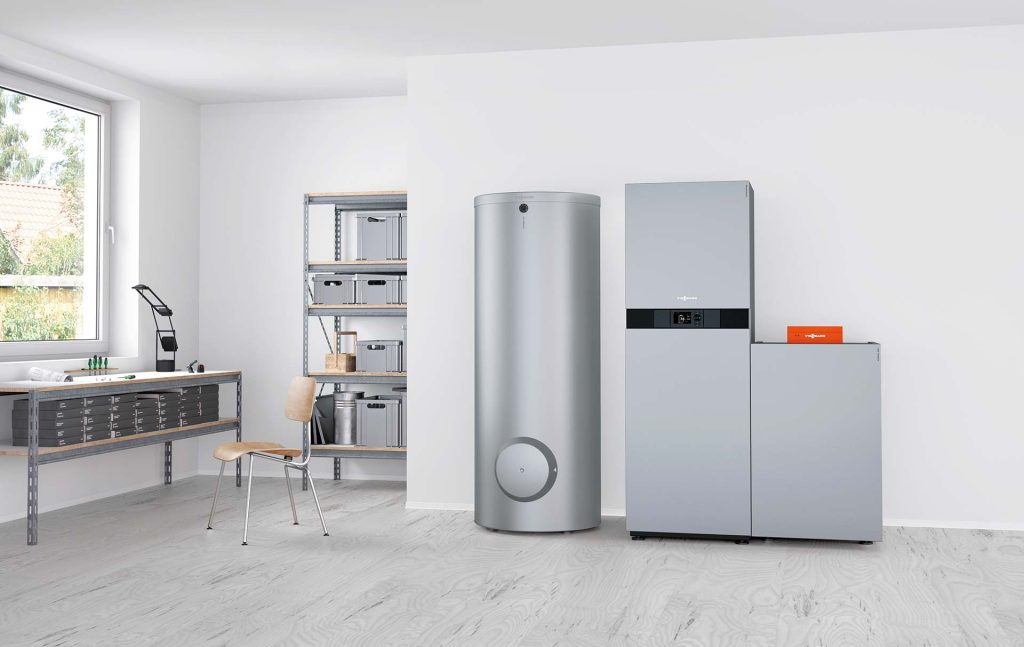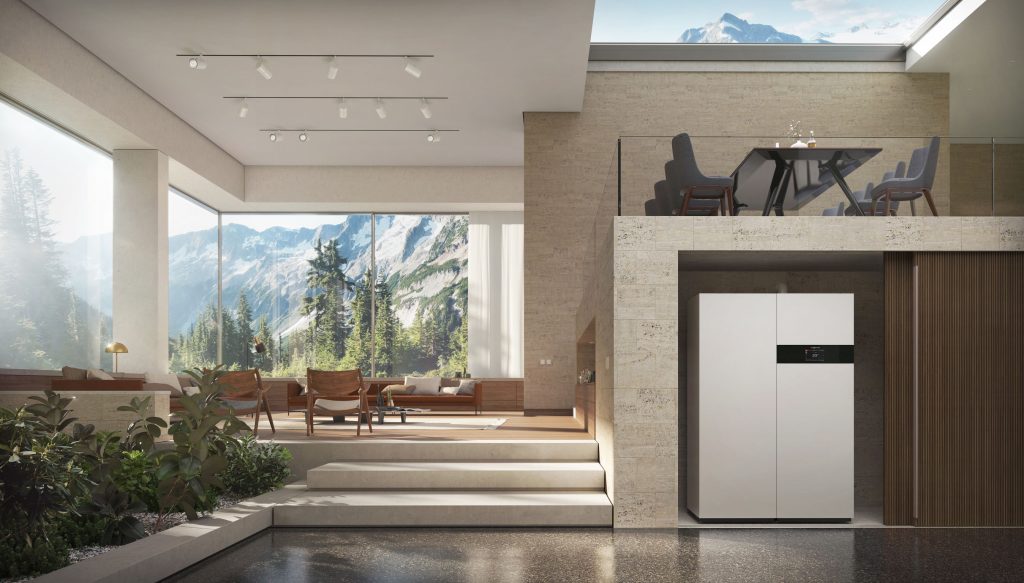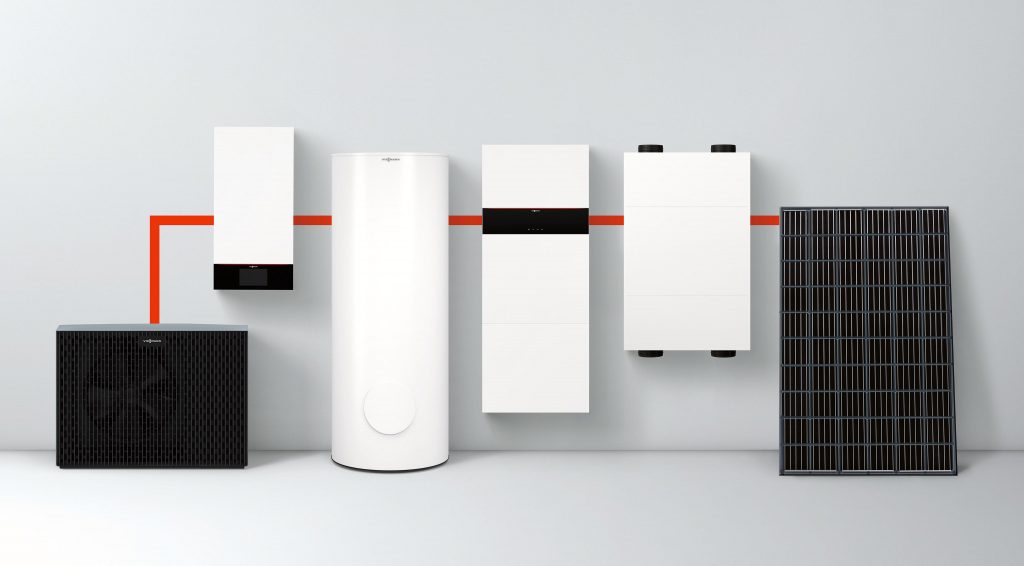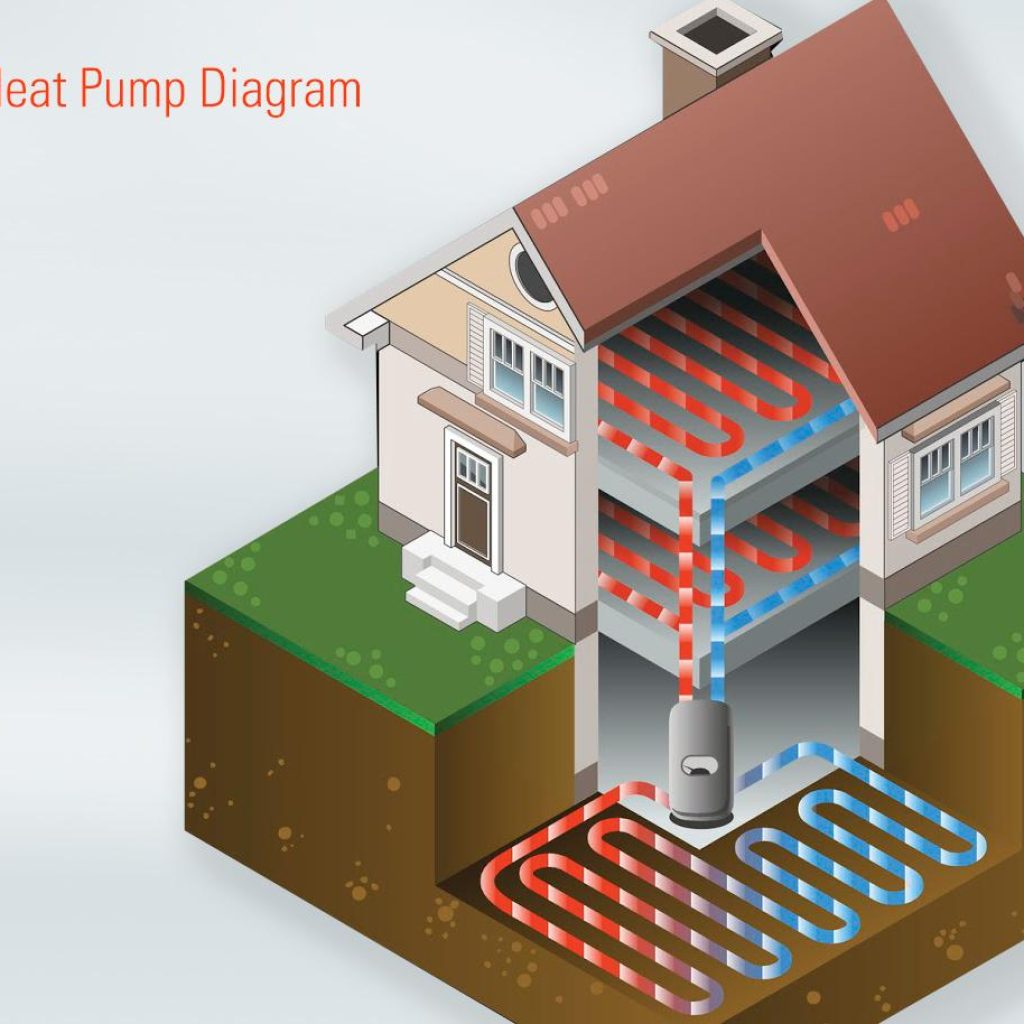| Hệ thống bơm nhiệt không khí và nguồn đất có rất nhiều ưu điểm bởi: Tận dụng nguồn nhiệt từ lòng đất và không khí: Công nghệ bơm nhiệt tiên tiến của Viessmann sử dụng nhiệt ẩn trong không khí ngoài trời và mặt đất để cung cấp hệ thống sưởi tiết kiệm chi phí và thân thiện với môi trường. Những máy bơm này có thể được sử dụng như các thiết bị độc lập hoặc chúng có thể được tích hợp vào hệ thống sưởi ấm hiện tại của bạn như một nguồn nhiệt bổ sung. Vận hành bơm nhiệt giúp tiết kiệm tài nguyên quý giá: Trái ngược với các thiết bị sưởi ấm truyền thống, hệ thống bơm nhiệt khai thác năng lượng tái tạo từ mặt đất, mặt trời, nước ngầm hoặc không khí. Do đó, chúng giảm tiêu thụ nhiên liệu hóa thạch đồng thời bảo tồn các nguồn tài nguyên có giá trị trong quá trình này. Nhờ vậy, lượng khí thải CO2 gây hại cho môi trường cũng được giảm đi tối đa. |
Hệ thống bơm nhiệt không khí Viessmann
Hệ thống bơm nhiệt không khí phục vụ như một sự thay thế tuyệt vời cho các hệ thống sưởi ấm thông thường. Không chỉ tạo ra nhiệt của riêng mình, sản phẩm có thể giúp bạn giảm cả hóa đơn điện và lượng khí thải carbon của bạn. Nhưng chính xác thì chúng là gì và sản phẩm có điểm gì đáng tiền?

Hệ thống bơm nhiệt không khí là gì?
Một máy bơm nhiệt không khí có thể là một hình thức sưởi ấm trung tâm carbon thấp di chuyển nhiệt từ một yếu tố ngoài trời tự nhiên. Với sự trợ giúp của điện, chúng có thể lấy nhiệt từ bên ngoài ở nhiệt độ ít nhất là -15 độ và chuyển đổi nó thành nhiệt có thể sử dụng được để sẵn sàng cung cấp cho bạn hệ thống sưởi dưới sàn hoặc bộ tản nhiệt nóng.
Bằng cách sử dụng nguyên lý hoạt động ngược lại nguyên tắc của tủ lạnh, hệ thống bơm nhiệt không khí có thể tạo ra nhiệt từ môi trường. Cụ thể, trong khi tủ lạnh hoạt động bằng cách hút không khí ấm ra khỏi thiết bị và làm giảm nhiệt độ thì máy bơm nhiệt không khí sử dụng nhiệt từ bên ngoài và đưa nó vào nhà của bạn.
Để quá trình này xảy ra, người dùng cần chuẩn bị quạt hút không khí vào và chuyển nó đến bộ trao đổi nhiệt (hoặc thiết bị bay hơi). Ở đây, chất làm lạnh có chứa nhiệt mới thu được sẽ được tuần hoàn và nén bằng điện để tạo ra nhiều nhiệt hơn nữa. Điều này sau đó có thể được chuyển đến hệ thống sưởi ấm và nước nóng trong nhà của bạn.
Máy bơm nhiệt nguồn không khí có cấu trúc phù hợp với cấu trúc căn nhà của bạn và kích thước sản phẩm sẽ phụ thuộc vào kích thước nhà của bạn, số lượng người sống ở đó và nhu cầu sưởi ấm và nước nóng của bạn.

Tại sao chọn một máy bơm nhiệt không khí?
Vì vậy, tại sao một máy bơm nhiệt nguồn không khí phù hợp với bạn?
Nhờ thiết kế hiệu quả cao và hiệu quả của hệ thống, các giải pháp này có thể tạo ra nhiệt ngay cả khi nhiệt độ bên ngoài xuống thấp tới -15°C. Điều này đánh tan lầm tưởng rằng máy bơm nhiệt chỉ hiệu quả ở vùng khí hậu ấm hơn và sự thật thật sự tuyệt vời khi chúng có thể tiếp tục thu thập hơi ấm ngay cả khi nhiệt độ giảm vào ban đêm.
Cùng với việc cung cấp nhiệt trong khí hậu lạnh giá, máy bơm nhiệt nguồn không khí cũng có thể đóng vai trò là hệ thống làm mát trong mùa hè. Với hệ thống làm mát, bạn có thể tận hưởng sự thoải mái tại nhà quanh năm chứ không chỉ trong mùa đông.
Ngoài ra, máy bơm nhiệt nguồn không khí cũng dễ dàng lắp đặt hơn so với máy bơm nhiệt nguồn mặt đất. Vì vậy nếu bạn đang lo lắng về công việc lắp đặt lộn xộn thì hãy yên tâm vì sản phẩm có thể loại bỏ nhu cầu vận chuyển và lưu trữ nhiên liệu, yêu cầu bảo trì tối thiểu và có tuổi thọ cao.
Tóm tắt những ưu điểm của máy bơm nhiệt nguồn không khí
- Nguồn nhiệt có sẵn bất cứ lúc nào trong ngày
- Chi phí đầu tư tương đối thấp
- Có thể mở rộng nhờ chức năng xếp tầng
- Thích hợp cho cả các dự án xây dựng mới và hiện đại hóa có thể trang bị thêm
- Thân thiện với môi trường
- Máy bơm nhiệt nguồn đất (địa nhiệt)
- Hệ thống sưởi & làm mát
Hệ thống bơm địa nhiệt Viessman
Bạn đang tìm kiếm giải pháp thay thế cho một nồi hơi gas? Bạn có thể đã nghe thuật ngữ ‘máy bơm nhiệt’ được sử dụng khi nghiên cứu các thiết bị sưởi ấm thay thế nhưng lại không biết máy bơm nhiệt là gì và liệu sản phẩm có xứng đáng để trang bị cho ngôi nhà của mình hay không. Chà, máy bơm nhiệt nguồn đất của Viessmann là một cách tuyệt vời để sưởi ấm ngôi nhà của bạn theo cách xanh, bền vững hơn.
Máy bơm nhiệt nguồn đất là gì?
Máy bơm nhiệt nguồn đất là một hệ thống sưởi ấm thân thiện với môi trường và cực kỳ phù hợp cho ngôi nhà của bạn. Sử dụng bộ thu nhiệt địa nhiệt hoặc đầu dò địa nhiệt, chúng thu thập nhiệt tự nhiên từ mặt đất và sử dụng nó để cung cấp cho ngôi nhà của bạn hệ thống sưởi và nước nóng. Vì nhiệt độ mặt đất khá ổn định trong suốt mùa hè và mùa đông, chúng có thể hoạt động quanh năm và thậm chí cung cấp khả năng làm mát vào mùa hè.
Đối với hầu hết các máy bơm nhiệt nguồn mặt đất, có hai cách để tiếp cận nhiệt tự nhiên – từ mạch vòng hở hoặc vòng kín. Trong danh mục vòng khép kín, có hai dạng khác nhau bao gồm: vòng đất ngang và lỗ khoan dọc. Tất cả các máy bơm nhiệt nguồn đất của Viessmann đều có thể được sử dụng trong cả mạch hở và mạch kín.
Hệ thống sưởi ấm và làm mát bằng nguồn đất đang ngày càng trở nên phổ biến khi mọi người có xu hướng tìm kiếm các giải pháp năng lượng thân thiện với môi trường hơn cho ngôi nhà của họ. Bằng cách khai thác các nguồn tài nguyên tự nhiên, có thể tái tạo, hệ thống làm mát và máy bơm nhiệt nguồn đất có thể giúp bạn cắt giảm lượng khí thải carbon và giảm hóa đơn năng lượng.
Bạn có thể giảm thêm lượng khí thải của nhà mình bằng cách chọn một thiết lập cho phép máy bơm được cung cấp năng lượng từ các nguồn năng lượng tái tạo khác, chẳng hạn như các tấm pin mặt trời quang điện.

Lợi ích của máy bơm nhiệt nguồn mặt đất là gì?
Ngày càng nhiều người đang chọn chuyển sang máy bơm nhiệt vì những lợi ích của loại hệ thống này. Bạn có thể tìm thấy một số trong số này được liệt kê dưới đây.
Thân thiện với môi trường
Máy bơm nhiệt có thể đồng thời khai thác nhiệt tự nhiên trong lòng đất và sử dụng điện để sưởi ấm ngôi nhà của bạn. Điều này làm cho chúng thân thiện với môi trường hơn so với các đối tác khí đốt của chúng, nhưng vẫn cần lưu ý rằng điện có thể được tạo ra thông qua việc đốt nhiên liệu hóa thạch.
Bên cạnh đó, bạn có thể làm cho máy bơm nhiệt của bạn thân thiện hơn với môi trường bằng cách sử dụng nó cùng với các tấm pin mặt trời hoặc năng lượng được tạo ra từ các nguồn tái tạo khác.
Tiết kiệm năng lượng
Máy bơm nhiệt hiệu quả hơn nồi hơi gas. Trên thực tế, người ta cho rằng trong khi nồi hơi gas có hiệu suất khoảng 95%, máy bơm nhiệt có thể hiệu quả hơn 400% vì cứ mỗi đơn vị điện được sử dụng, khoảng bốn đơn vị nhiệt được tạo ra và sử dụng.
Cung cấp làm mát cũng như sưởi ấm
Không giống như nồi hơi, chỉ có khả năng sưởi ấm ngôi nhà của bạn, hệ thống bơm nhiệt cũng có thể làm mát ngôi nhà của bạn bằng cách làm việc ngược lại.

Đủ điều kiện nhận trợ cấp
Những ngôi nhà được lắp đặt máy bơm nhiệt đủ điều kiện cho chương trình nâng cấp lò hơi (BUS).
Giảm hóa đơn năng lượng
Mặc dù điện có giá cao hơn khí đốt, nhưng trên thực tế một máy bơm nhiệt thực sự có thể tốn ít chi phí hơn để chạy mỗi năm so với nồi hơi gas. Vì vậy bạn có thể giảm hóa đơn sưởi ấm hàng năm của mình.
Đi kèm với bảo hành
Tất cả các máy bơm nhiệt của Viessmann đều được bảo hành tiêu chuẩn hai năm, tuy nhiên điều này cũng có thể được gia hạn nếu được lắp đặt bởi trình cài đặt Viessmann đã đăng ký.
Làm việc ngay cả ở nhiệt độ thấp
Nếu bạn lo lắng rằng một máy bơm nhiệt không thể tạo ra đủ nhiệt khi nhiệt độ bên ngoài giảm xuống dưới 0 thì đừng quá lo lắng. Chúng có thể thu nhiệt ngay cả khi bên ngoài thấp tới -20 ° C.
Bảo trì thấp
Máy bơm nhiệt không dựa vào bất kỳ việc cung cấp nhiên liệu nào và chỉ yêu cầu dịch vụ hàng năm để đảm bảo chúng hoạt động an toàn và hiệu quả nên rất dễ để vận hành. Với những lợi thế này, không khó để hiểu tại sao công nghệ này tiếp tục phát triển phổ biến không chỉ khắp Vương quốc Anh mà còn trên toàn thế giới.
Máy bơm nhiệt nguồn mặt đất hoạt động như thế nào?
Như đã đề cập, một máy bơm nhiệt nguồn mặt đất thu thập nhiệt từ bên ngoài và đưa nó vào nhà của bạn. Nó thực hiện điều này thông qua các đường ống chứa đầy chất lỏng truyền nhiệt và đặt trong lòng đất. Nhiệt này sau đó được chuyển đến chất làm lạnh sôi ở nhiệt độ thấp bay hơi thành khí.
Trong bộ trao đổi nhiệt ngưng tụ, khí bây giờ có thể được nén để tăng nhiệt độ hơn nữa, nâng mức nhiệt lên khoảng có thể được sử dụng để sưởi ấm ngôi nhà của bạn. Khi khí làm nóng nước khiến nhiệt độ nguội đi và ngưng tụ trở lại thành chất làm lạnh lỏng. Toàn bộ quá trình sau đó bắt đầu lại.
Máy bơm nhiệt và hệ thống làm mát địa nhiệt của Viessmann sử dụng công nghệ tiên tiến nhất để làm cho thiết bị hoạt động yên tĩnh nhất có thể, đồng thời tối ưu hóa tuổi thọ của thiết bị.
Một máy bơm nhiệt nguồn mặt đất lấy nhiệt từ mặt đất. Ống được đặt dưới mặt đất hoặc thông qua một lỗ khoan xung quanh nhà của bạn và một dung dịch nước và chất chống đông chảy qua chúng. Chính giải pháp này truyền nhiệt từ mặt đất và bắt đầu quá trình trên.

Nếu bạn có một lượng nước đáng kể xung quanh, chẳng hạn như một cái ao hoặc hồ lớn, bạn có thể sử dụng một máy bơm nhiệt nguồn nước để cung cấp nước nóng cho ngôi nhà. Cũng giống như trong hệ thống nguồn không khí, các đường ống chứa dung dịch chống đông có thể được đặt trực tiếp trong nguồn nước.
Tuy nhiên, điều quan trọng là khối lượng nước phải đủ lớn. Khi dung dịch trong đường ống hấp thụ nhiệt từ môi trường xung quanh máy bơm nhiệt, nhiệt độ nước có thể giảm xuống, khiến nó đóng băng. Điều này không nên xảy ra nếu lượng nước đủ lớn cho kích thước nhà của bạn.
Ngay cả khi bạn sống ở vùng khí hậu lạnh, máy bơm nhiệt có thể được sử dụng khi mặt đất hoặc không khí thấp tới -15 °C.
Máy bơm nhiệt được lắp đặt như thế nào?
Trước khi bạn tiến hành lắp đặt máy bơm nhiệt, một kỹ sư có trình độ phù hợp sẽ đến khu nhà để kiểm tra xem địa điểm và khu nhà có đạt yêu cầu hay không. Để đủ điều kiện nhận tài trợ RHI của chính phủ ở Vương quốc Anh, bạn cần có báo cáo MCS (Chương trình chứng nhận thế hệ vi mô).
Họ có thể sẽ cần phải đánh giá lượng vật liệu cách nhiệt mà bạn có, vì điều này có thể ảnh hưởng đến kích thước của máy bơm nhiệt của bạn. Để làm điều này, họ có thể yêu cầu tiếp cận vào sâu bên trong ngôi nhà của bạn. Nếu bạn đang lắp đặt máy bơm nhiệt nguồn nước, họ cũng sẽ muốn kiểm tra nước trên đất của bạn.
Máy bơm nhiệt nguồn không khí tương đối dễ lắp đặt, miễn là có một nơi thích hợp để đặt dàn nóng. Một dàn nóng sẽ được lắp đặt và các dây cáp và ống sưởi sẽ được luồn qua tường để kết nối với hệ thống sưởi.
Máy bơm nhiệt mặt đất thường tốn nhiều chi phí lắp đặt hơn do phí xử lý mặt bằng. Cụ thể, mặt đất sẽ cần phải được đào hoặc khoan để có thể chèn các đường ống hoặc lỗ khoan. Bạn cũng phải đảm bảo rằng mặt bằng có khả năng tiếp cận tốt đối với máy đào và các thiết bị lớn khác, cũng như có đủ không gian để đặt đường ống – nhà càng lớn thì càng cần đặt nhiều đường ống hơn.
Máy bơm nhiệt có xứng đáng với chi phí không?
Không chỉ Vương quốc Anh đang nỗ lực giảm lượng khí thải carbon và tăng cường sử dụng năng lượng tái tạo mà ngày càng có nhiều người tìm cách đầu tư vào máy bơm nhiệt. Những điều cần xem xét khi mua là:
Cả hai điều này nên được xem xét một cách thực tế để bạn có thể tính ra chi phí hàng năm so với chi phí của nồi hơi gas.
Điều đáng chú ý là việc lắp đặt máy bơm nhiệt chỉ cần thực hiện một lần. Thậm chí khi hệ thống đường ống đã được lắp đặt, người dùng chỉ cần thay thế các bộ phận bơm nhiệt trong tương lai. Điều này có nghĩa là một máy bơm nhiệt thay thế có thể rẻ hơn đáng kể.
Một số người có thể nghĩ rằng máy bơm nhiệt cũng sử dụng nhiều điện, tuy nhiên, hãy nhớ rằng hóa đơn gas của bạn sẽ giảm đáng kể và điều quan trọng hơn là phải nghĩ đến tổng mức sử dụng năng lượng và chi phí.
Bạn có thực sự tiết kiệm tiền với một máy bơm nhiệt?
Theo tính toán, máy bơm nhiệt trung bình sẽ sử dụng khoảng 4.000 kWh điện mỗi năm. Với chi phí khoảng 14 pence/kWh, máy bơm nhiệt của bạn có thể chạy với giá £560 mỗi năm (dựa trên COP là 4), ít hơn một nồi hơi đốt gas. Cùng với chương trình tài trợ của chính phủ, điều này có thể làm cho chi phí sở hữu máy bơm nhiệt rẻ hơn so với nồi hơi gas tiêu chuẩn.
Không giống như nồi hơi, máy bơm nhiệt còn có thể chạy bằng năng lượngtái tạo, chẳng hạn như năng lượng mặt trời được cung cấp bởi các tấm pin mặt trời. Điều này có nghĩa là bạn có thể giảm đáng kể mức tiêu thụ điện từ Lưới điện Quốc gia.
Bạn cũng có thể yêu cầu chính phủ hoàn lại tiền bằng cách sử dụng chương trình Ưu đãi nhiệt tái tạo (RHI) của họ. Nếu cài đặt đủ điều kiện cho chương trình, bạn cũng có thể nhận được khoản thanh toán hàng năm lên tới £1.000 trong bảy năm. Khoản thanh toán bổ sung này có thể đóng góp vào chi phí lắp đặt hệ thống bơm nhiệt của bạn. Để đủ điều kiện tham gia RHI, cả máy bơm nhiệt và trình lắp đặt của bạn phải được MCS phê duyệt.
Để biết thêm thông tin chi tiết hay cần được tư vấn thêm, quý khách có thể liên hệ trực tiếp với chúng chúng tôi qua hotline: (+84)24 6658 2772 hay qua Fanpage iHäus, quý khách cũng có thể lại thông tin liên hệ để chuyên viên tư vấn iHäus có thể hỗ trợ nhanh nhất.